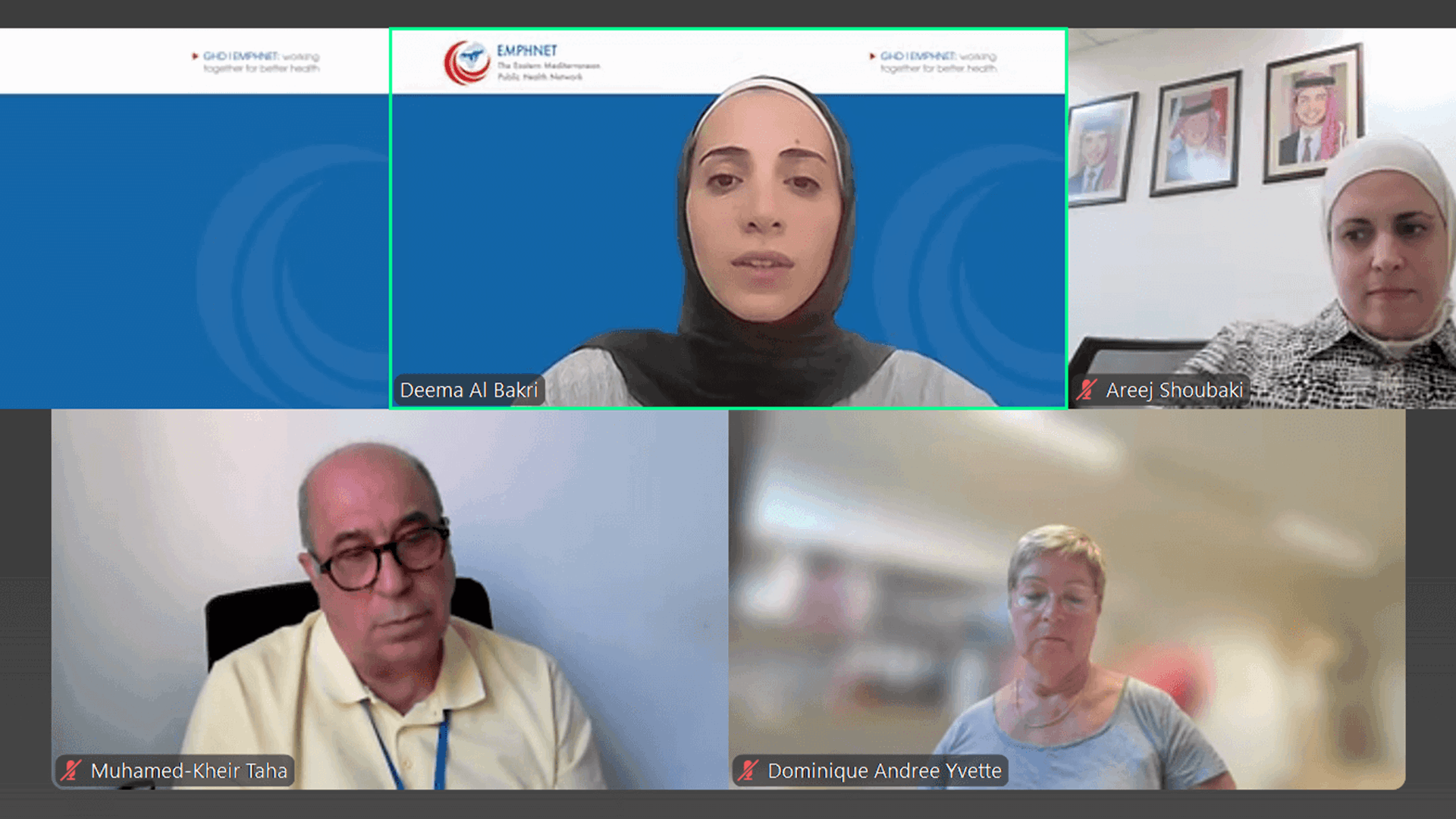Meningitis remains a major global health threat, particularly in low- and middle-income countries where fragile health systems are already under strain. Despite the availability of vaccines, outbreaks continue to occur. Globally, there have been calls for stronger prevention, surveillance, and response. Yet in the Eastern Mediterranean Region (EMR), challenges persist, particularly those related to limited laboratory capacity and data gaps.
To support regional progress, EMPHNET has been contributing to meningitis control through enhanced surveillance, collaboration, and knowledge exchange. A key initiative is the Meningitis and Septicemia Mapping (MenMap) Network, which connects Iraq, Jordan, and Egypt to strengthen surveillance, diagnostics, and cross-border collaboration.
Building on these efforts, EMPHNET hosted its 46th WEBi session, “Advancing Meningitis Surveillance in the Eastern Mediterranean Region,” on August 26, 2025, with over 240 participants. The session brought together leading global experts and regional practitioners to highlight the global burden of meningitis and showcase the achievements of MenMap.
Featured Speakers
Moderated by Dr. Deema Al Bakri, Technical Officer at EMPHNET, the webinar featured:
- Prof. Dominique A. Caugant, Chief Scientist at the Division for Infection Control, Norwegian Institute of Public Health; WHO Collaborating Centre for Reference and Research on Meningococci; and Professor Emeritus, Faculty of Medicine, University of Oslo.
- Prof. Muhamed-Kheir Taha, Head of the Invasive Bacterial Infections Unit at Institut Pasteur, Paris; Head of the French National Reference Centre for Meningococci and Haemophilus influenzae; and WHO Collaborating Centre for Meningitis.
- Dr. Areej H. Shoubaki, Field Epidemiologist at the Surveillance Department, Jordanian Ministry of Health.
Key Discussion Points
Global Burden and the Path to 2030
Prof. Caugant presented an overview of the global meningitis burden, underscoring its disproportionate impact on children and fragile health systems. She emphasized that the WHO 2030 targets, though ambitious, are achievable through sustained vaccination campaigns, stronger surveillance systems, effective advocacy, and global solidarity and equitable access to interventions. She also reflected on Africa’s successful rollout of the Men5CV vaccine, noting its high coverage and positive impact, while stressing the need for sustainable financing and equitable distribution.
MenMap: Strengthening Regional Surveillance
Prof. Taha presented findings from MenMap’s first year of implementation (December 2023–November 2024), reporting over 2,100 suspected cases across Iraq, Jordan, and Egypt, of which 191 were confirmed as bacterial meningitis. Streptococcus pneumoniae emerged as the most common pathogen, with children under five identified as the most affected group, and Iraq recording the highest number of confirmed cases. He highlighted how the introduction of real-time PCR significantly improved both the accuracy and speed of diagnosis, while External Quality Assessments validated laboratory performance across sentinel sites. He concluded by emphasizing MenMap’s regional value, not only as a reporting exercise but as a collaborative initiative that strengthens surveillance systems, fosters cross-country learning, and offers a model that can be expanded and replicated in other contexts.
Jordan’s National Experience
Dr. Shoubaki shared Jordan’s progress in building laboratory networks and enhancing diagnostic capacity. She stressed the importance of workforce training, embedding meningitis surveillance within broader preparedness frameworks, and ensuring long-term sustainability of sentinel sites.
Panel Discussion and Audience Q&A
The interactive session brought participants into a rich discussion spanning both technical and policy dimensions. Conversations covered balancing clinical versus laboratory diagnosis, the added value of Men5CV compared to Men4CV, and the feasibility of meeting WHO’s 2030 Roadmap goals. Country-specific challenges in surveillance and response were explored, along with the critical importance of data sharing, regional coordination, and advocacy. Lessons were also drawn from countries with low meningitis incidence, such as Canada, the USA, and China, providing comparative insights to inform regional strategies.
Key Takeaways
The session concluded with several clear messages. First, meningitis continues to be a lethal yet preventable disease, underscoring its global urgency. Second, the MenMap initiative, as a regional example, highlights how regional cooperation can significantly strengthen surveillance and diagnostics. Third, national-level investments in laboratories and workforce capacity are translating into measurable improvements. Finally, sustained collaboration across governments, donors, academia, and civil society is essential to achieving the 2030 goals. The discussion ended with a call to expand MenMap, scale up collaboration, and integrate meningitis surveillance into broader health security frameworks for the EMR.
Watch the webinar.



